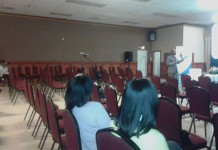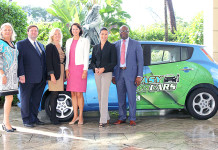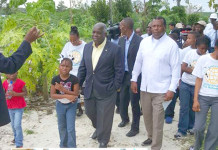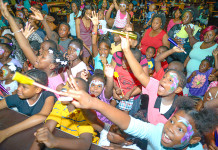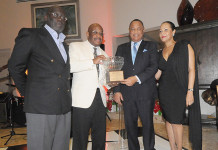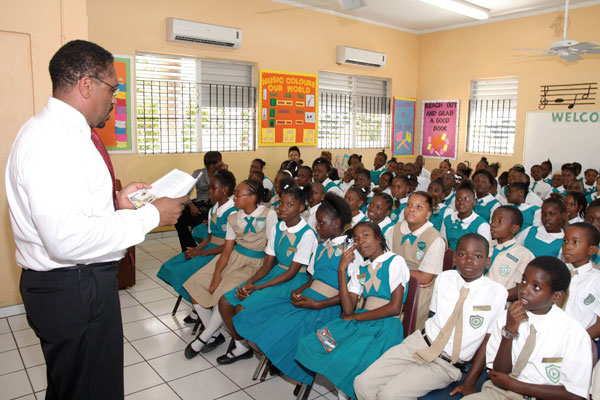
Nassau, The Bahamas – Minister of Health, Dr. the Hon. Hubert A. Minnis and AIDS Foundation of The Bahamas president, Lady Camille Barnett, teamed up Monday to bring the message of HIV/AIDS awareness to sixth-grade students of the Columbus Primary School in a novel way – through book reading.
Dr. Minnis and Lady Barnett’s collaboration was part of a national effort involving officials from the AIDS Foundation of The Bahamas and 17 guest readers who read excerpts from the book: “Under the Calabash Tree” to sixth-grade students throughout the Commonwealth of The Bahamas.
The effort was part of an AIDS Foundation of The Bahamas initiative to “Combat HIV/AIDS through a Culture of Literacy and Learning” and was organised just days ahead of World’s AIDS Day which will be observed on Wednesday, December 1, 2010.
AFOB officials targeted sixth-grade students throughout the country as adolescents are the fastest growing population segment of HIV-infected persons in The Bahamas. Research shows that, on average, boys in The Bahamas are sexually active as early as 11 years of age, while girls have their first sexual encounter at the age of 12.
“And so this is the age-group that is most vulnerable,” Lady Barnett said “Literacy and education and awareness go hand-in-hand and we thought we had to find creative ways to get the information across to the younger children in a way that they can comprehend it best, and what better way to do it than through a book and a guest reader to read to them.
“They say knowledge is power, and so we want to give them the knowledge, the information, so that they can make better decisions,” Lady Barnett added.
Lady Barnett said one of the primary objectives of the initiative was “to get to students at an early age” so that they can be aware of the pitfalls of having pre-marital sex, and to dispel some of the myths and/or taboos associated with the disease.
“Today provided us with an opportunity to get to them while they are still young and before the stigma and discrimination associated with HIV/AIDS really sets in. That stigma and discrimination actually prevents people from going in and getting the medication that can save their lives,” Lady Barnett said.
“People will not go into the clinic at the Princess Margaret Hospital for their medication if they see someone they know in the clinic or sometimes just on the compound. What I liked about today’s session was that the kids have the knowledge, they are not being shielded, which is often the case, and so we did not have to tip-toe around some of the issues.”
Health Minister Minnis said he was “most impressed” with the level of the questions asked by the sixth-graders regarding HIV/AIDS.
“The questions were very intelligent and show that they have an understanding of how HIV/AIDS is contracted and that you cannot get it by touching individuals, by hugging, by eating from them or being in the same room with them,” Dr. Minnis said.
“Kids can now relay this message to their parents because some parents still have it stigmatised, but now that the kids know better, they can have open, positive discussions with their parents on HIV/AID which may lead to some of the stigma being detached from HIV/AIDS,” Dr. Minnis added.
Dr. Minnis said the education and awareness programme instituted by the Aids Foundation of The Bahamas is in line with his Ministry’s belief that prevention is always better than cure.
“Once the children understand prevention, they can be your messenger. They are the ones that we must protect; they represent tomorrow and if they understand aspects of the disease – how it is transmitted; what is HIV/AIDS – they will protect themselves which can lead to a reduction in the number of HIV/AIDS transmissions in our country – particularly considering the research on adolescents and HIV/AIDS,” Dr. Minnis added.
Lady Barnett said there is an “added value” for the AIDS Foundation of The Bahamas.
“The added value is that sometimes when children have to listen to older persons, the message can get lost,” Lady Barnett said. “Now these children (those across The Bahamas who schools participated in the programme) can go into their various communities and have positive conversations about HIV/AIDS with other children their ages and so the message is more relevant coming from a peer.”
Lady Barnett said there is a secondary benefit as well.
“They now know what the truths and myths are with regards to HIV/AIDS and so when their peers start telling them things that are untrue, they can say ‘I know what the truth is; I know what the situation truly is.’
“It empowers them to be able to make wise decisions (with regards to sex and sexuality”,” Lady Barnett added.


